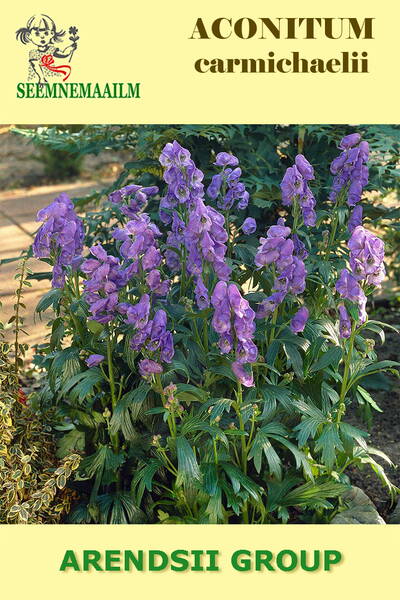Your shopping cart is empty!
Carmichael's monkshood (Japanese aconite, Sichuan aconite)
Japanese aconite (Carmichael's monkshood) - Aconitum carmichaelii.Perennial from the family Ranunculaceae.
Origin: first hybridized by Georg Arends of Ronsdorf, Germany in 1945.
Features: majestic, tall, branched inflorescences with closed blue flowers. Considered one of the best late-blooming perennials.
Caution: all parts of the plant are poisonous, including the roots.
Flowering plant height: 150 cm, suitable for cutting.
Distance between plants: 60 cm.
Flower color: dark blue.
Natural flowering period: September - October.
Winter hardiness zones: Z3 – Z9.
Soil requirements: rich in humus, fertile.
1.0 g = 360 seeds.
Name: latinization of the Greek "akoniton", the name of a plant used to poison wolves and other predators. The etymology of the word is unclear.
From history: the name probably comes from the ancient Greek city of Akone, in the vicinity of which these flowers grew in abundance. Grows wildly in Central China.
Plant up to 150 cm tall. The leaves are three-lobed. The flowers are light blue, collected in large inflorescences up to 60 cm long. Blooms in September-October. In culture since 1886.
It has varieties with blue (Barkers Bar) and blue-violet flowers (Wilsoni). Variety var. wilsonii from Central China has beautiful inflorescences and reaches 120-180 cm in height.
Location: all aconites are frost-resistant, unpretentious plants. They feel equally good both in illuminated places and in partial shade. Climbing species grow and bloom better in shady places. Can't stand hot places!
Soil: any cultivated soil is suitable for planting, except waterlogged soil, as well as sandy and crushed stone. Does not tolerate stagnant water in autumn!
Care: very responsive to organic and mineral fertilizers, even small doses improve their growth and flowering, and respond well to loosening and weeding. It is recommended to mulch the soil 2-3 times per season with a 2-3 cm layer of peat. In dry weather, watering is required. To preserve the decorative appearance of the plantings, it is necessary to remove faded inflorescences. The bushes grow quickly and the plantings thicken after 4-5 years, so division is required.
Origin: first hybridized by Georg Arends of Ronsdorf, Germany in 1945.
Features: majestic, tall, branched inflorescences with closed blue flowers. Considered one of the best late-blooming perennials.
Caution: all parts of the plant are poisonous, including the roots.
Flowering plant height: 150 cm, suitable for cutting.
Distance between plants: 60 cm.
Flower color: dark blue.
Natural flowering period: September - October.
Winter hardiness zones: Z3 – Z9.
Soil requirements: rich in humus, fertile.
1.0 g = 360 seeds.
Name: latinization of the Greek "akoniton", the name of a plant used to poison wolves and other predators. The etymology of the word is unclear.
From history: the name probably comes from the ancient Greek city of Akone, in the vicinity of which these flowers grew in abundance. Grows wildly in Central China.
Plant up to 150 cm tall. The leaves are three-lobed. The flowers are light blue, collected in large inflorescences up to 60 cm long. Blooms in September-October. In culture since 1886.
It has varieties with blue (Barkers Bar) and blue-violet flowers (Wilsoni). Variety var. wilsonii from Central China has beautiful inflorescences and reaches 120-180 cm in height.
Location: all aconites are frost-resistant, unpretentious plants. They feel equally good both in illuminated places and in partial shade. Climbing species grow and bloom better in shady places. Can't stand hot places!
Soil: any cultivated soil is suitable for planting, except waterlogged soil, as well as sandy and crushed stone. Does not tolerate stagnant water in autumn!
Care: very responsive to organic and mineral fertilizers, even small doses improve their growth and flowering, and respond well to loosening and weeding. It is recommended to mulch the soil 2-3 times per season with a 2-3 cm layer of peat. In dry weather, watering is required. To preserve the decorative appearance of the plantings, it is necessary to remove faded inflorescences. The bushes grow quickly and the plantings thicken after 4-5 years, so division is required.
Eng.: Carmichael's monkshood, Japanese aconite, Sichuan aconite.












